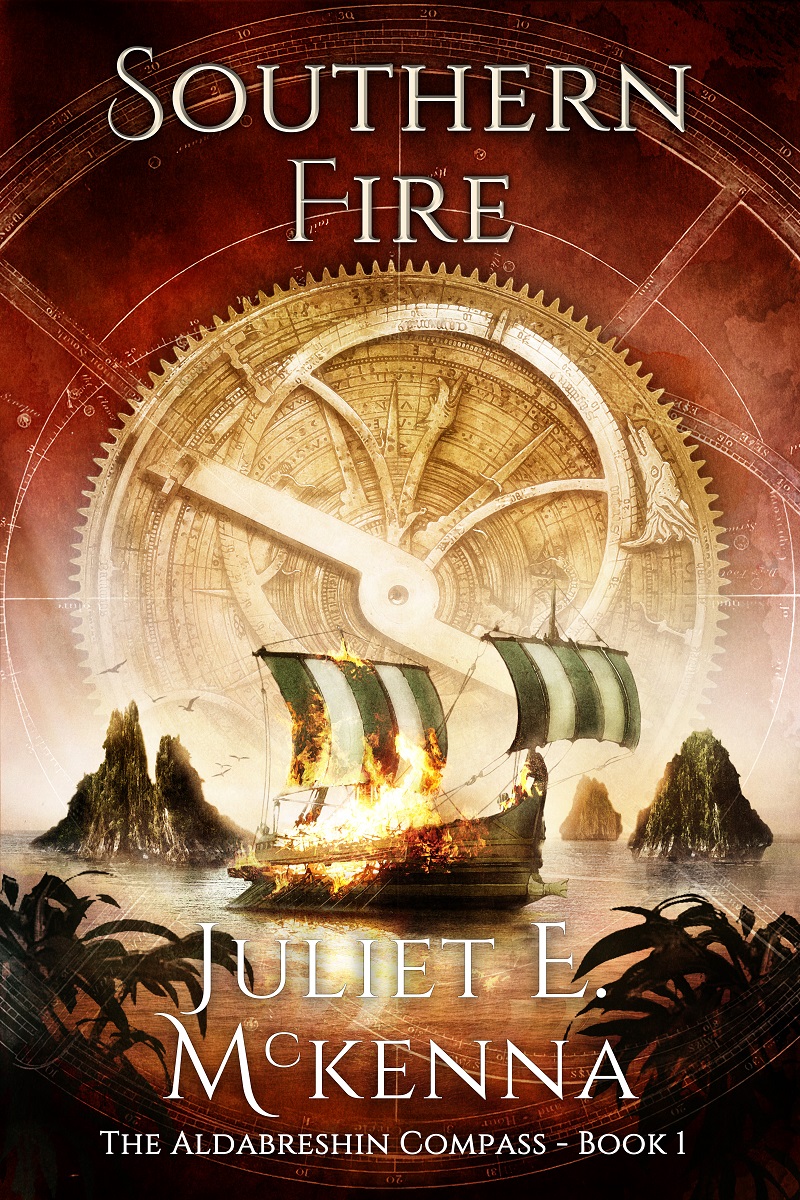Juliet E. McKenna’s new book, SOUTHERN FIRE is out this week, and I asked her if she’d like to talk about the “making of” this new world….Â
Set in the Archipelago, the first book in THE ALDABRESHIN COMPASS tells the story of Daish Kheda, ruler of a peaceful southern domain. From the outer islands comes the news that a powerful sorcerer is wreaking chaos and destruction. But the locals are wary of magic and refuse to fight fire with fire.
His own family and domain threatened, Kheda resolves to defeat the unknown power of the south – a decision that will lead to battles of sword and wizardry, and the discovery of a magical force the like of which has never been imagined.
and now, Juliet talks about creating myth where there are no myths…
We’re surrounded by myths. We learn about magic and unearthly beings at school in tales of Ancient Greece and Rome, from Celtic and Norse folklore. We see these stories driving plots in TV shows from Stargate SG-1 to Supernatural. They’re the wellspring for the Urban Fantasy genre which is merely one facet of myth-making still going on today. Modern folk lore is endlessly refreshed with tales of UFOs, alien greys, Bigfoot, Yetis and the Loch Ness Monster. Shows like Criminal Minds draw on tales of more tangible monsters like serial killers. Belief in shadowy government conspiracies underpins the popularity of a TV series like Scandal. The truth is out there? Hardly. We all know it’s hidden in the X-Files…
Epic fantasy writers draw on all these sources as inspiration for their own fictional myth-making. Some of the most fun to be had in world-building is inventing whatever beliefs or pantheon enrich and enlarge your character’s lives and the setting around them. Readers ask authors endless questions about this stuff. I firmly believe this innate human fascination with myth is a large part of fantasy fiction’s enduring appeal.
So wasn’t I rather shooting myself in the foot when I devised a fantasy society without any gods at all? The Aldabreshi have an entirely different belief system, focused on astrology and divination. Fortunately these particular practises have just as long a history, as humanity’s always sought to find hidden truths in the darkness beyond the campfire’s light. I found fascinating books to read, outlining Babylonian astrology and the creation of the first calendars, through to the ways Greeks and Romans took their auspices before vital events; sacrificing animals to read their entrails, and rather less bloodily, detailing how they interpreted the obscure utterances of oracles.
Beliefs based on natural phenomena and observations may now be dismissed as mere superstition but they endure beyond casually throwing spilled salt over a shoulder. Starting with ancient beliefs in talismanic jewels, I found myself researching modern crystal therapy theory and the supposed properties of precious and semi-precious stones. That fitted wonderfully well with the Aldabreshi calling their world’s planets the Heavenly Jewels. Though I’ve yet to find a use for the story of doctors in 1920s Spain finding that their patients were putting prescriptions under their pillows rather than getting their medications. Because those Words of Power would cure the sick as readily as any pills, right?
Then something unexpected happened as I began writing Southern Fire. Because when you have a fantasy world with designated gods, you have specific religious rites and liturgies. Observance will have its particular time and place, whether that’s within the home or in the community shrine or temple. There are all sorts of uses a writer can make of that; to drive the plot and to reveal facets of characters and their motivation. Belief in omens turned out to be rather different. It’s there all the time, not only when someone makes a conscious choice to look for signs. Anything out of the ordinary must be examined for significance if this is to be a truly convincing element of this worldview.
When trust in portents is the foundation of someone’s belief system, that’s going to influence their choices and behaviour in a distinctly different way. Along with all the other things that will influence such decisions, such as their own conscious or unconscious desires. What happens when those portents are directly contradicting what someone really wants to do? Will they find a way to justify sticking to that course of action or talk themselves into taking a different path? How will unpleasant people abuse such pervasive cultural beliefs to excuse repellent behaviour?
I’d set out to write a distinctly different epic fantasy, to make sure I didn’t end up repeating the Tales of Einarinn. This particular aspect of life in the Archipelago turned out to play a major part in making the Aldabreshin Compass very much NOT the usual sort of story.
You can find SOUTHERN FIRE via Wizard’s Tower Press  (links to Kobo, Amazon US and UK, B&N, and Google Play).  You can find Juliet herself here, and there.
